He’s a competitive racer ranking fastest in the U.S. – second in the world. He plays rugby, golf and tennis. He even water skis, snow skis and dives for fun. And, by the way, he’s quadriplegic.

Duane Morrow, Primerica’s Executive Vice President of Field Marketing, was living and working in England when he broke his neck during a rugby game in 2004. He was paralyzed from the chest down, but, for this tenacious athlete, life didn’t end. It simply changed … and he adapted.
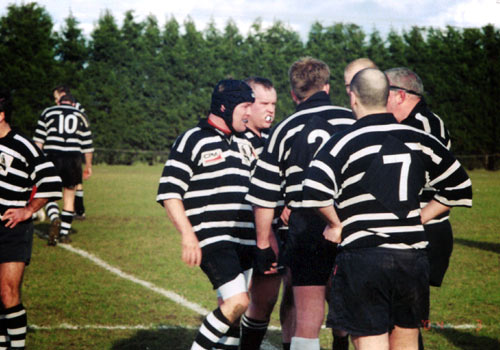
Life 2.0
After surgery and months of inpatient rehabilitation at the Shepherd Center in Atlanta, Morrow was ready for more. He had been told that there was a 99% chance he’d never walk again, but he rebuked those odds. He asked his nurses to wake him up at 5 a.m. so he could be at the gym at 6 a.m. when it opened. He worked out for hours, trying to retrain his body to walk.
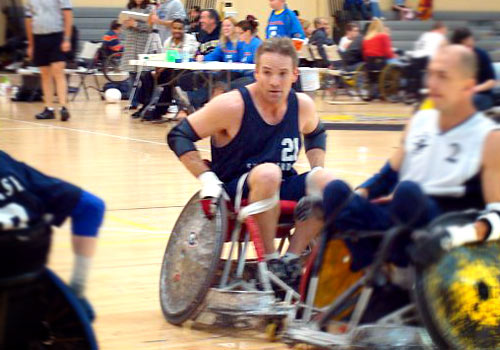
Morrow saw how the therapy was helping him over time. He met with Shepherd Center officials to try to establish an extreme therapy program for other athletes who wanted to go beyond traditional treatments. While the center was not equipped for the program at the time, only four months later, Morrow got a call from Gary Ulicny, president of the Shepherd Center. He wanted to try it out. Beyond Therapy was born. Now, two years later, the program has doubled in size. Plus, there’s a 100-person waiting list … and Morrow is the spokesperson. His Primerica family is not surprised. Morrow’s excitement and determination have become a banner – an example of what it means to be a Primerica rep.
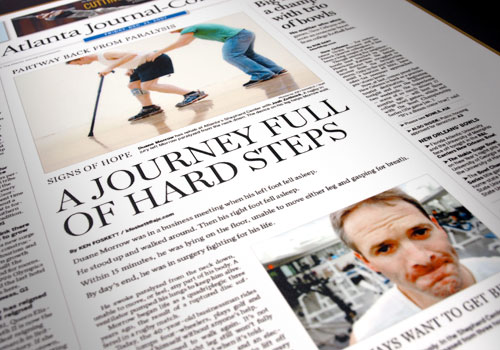
That drive, a “saint” for a wife, hard work and top-notch technology – like robotic treadmills – helped him to begin standing with assistance, Morrow says. But he gives the real credit where he says credit is due: “Doctors don’t know everything. God’s pretty cool.” Today he has renewed use of his arms and hands, and even walks with the use of a cane.
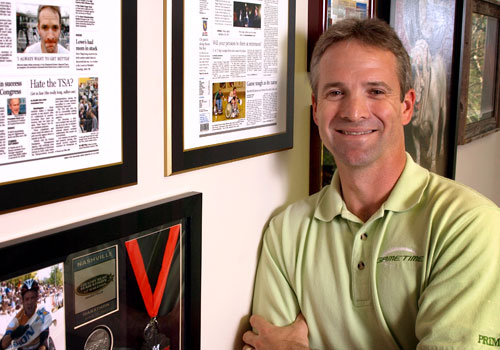
While he’s no longer an inpatient at the Shepherd Center, Morrow still receives physical therapy there. When he’s not traveling the country on Primerica business, he routinely walks seven flights of stairs. He throws medicine balls and he runs in the pool. He’s hardcore. “You can adapt, or you can go into a cave and give up,” Morrow says. “The technology exists. You can figure it out.”
Now Morrow is helping other people “find their new normal.” He visits Shepherd’s patients often – even those he’s never met before. He explains that people who once took 15-20 minutes to get ready in the morning are now taking 1-2 hours. Their lives have changed dramatically on all levels and, according to him, there are certain things that are better learned from someone who’s figured out how to live this new life. So, why has he taken on this personal mission? “Everyone wants to live a life of significance,” he says. “That’s real wealth.”
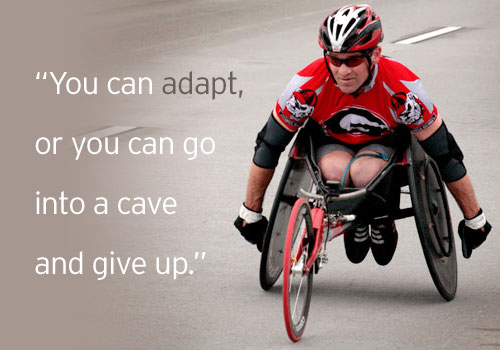
It Ain’t Over
He’s convinced (and convincing!) that people with physical disabilities can lead extreme lives. For the past four years, he’s participated in an Adventure Skills Workshop sponsored by the Shepherd Center – two years as a patient, two as a volunteer counselor. People with all degrees of ability attend these workshops to participate in rugby, rock wall climbing, tubing, fishing, water skiing, zip lining and more! Morrow says the real advantage is that they get to be with 200 other people who are looking for their new normal, too. Many of them find it there, too. One man at a recent camp says he thought he would never hunt again. But, with the help of harnesses and assistance, he was able to find a new way to do something he always loved.
Making It Work
For Morrow, this whole experience has been a lesson in perseverance. It’s a lesson that he believes able-bodied people can learn, too. He tells how people can begin learning from the disabled: First, he says, don’t let little inadequacies embarrass you. Work through them. Second, introduce children to people with disabilities. That way, it’s not uncomfortable to them when they are in close quarters with someone in a wheelchair. Plus, they’ll learn that setbacks don’t have to mean the end of the world. Finally, ask before helping a disabled person, and don’t be offended if he or she says, “no.” They don’t need as much help as we think, he says. Besides, some disabled people, like Morrow himself, can be more “able” than the rest of us!
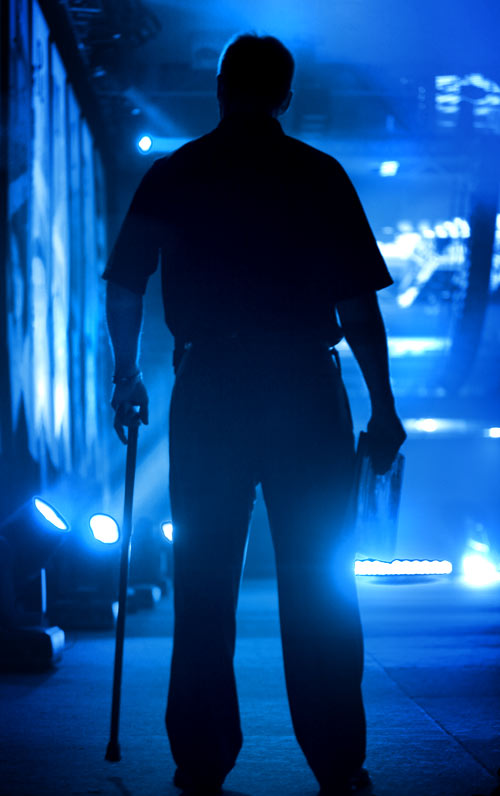
Related
38 Comments
Comments are closed.



Thank you, Duane.
My “challenge” has been a stutter. You inspire me, dude. Because you win, we all win. God bless you, brother.
Duane..
You are a true inspiration and a ” Winner “. Positive attitude can help us achieve the impossible.
Blessings to you and yours..
Rob
Duane, from the first time I witnessed the “murder ball” event in Tampa, I knew you were a winner, inside and out! May God continually bless his comptitive, energetic, inspired and faithful servant as your journey moves forward.
Duane,While we worked together in the US & UK you were always so positive. When this accident happened you proved your faith in God and incredible outlook on life. I count it a blessing to be your friend.You are an inspiration to all & eliminate all the excuses! Jeff Lestz
D-
It was a real treat to finally meet you in person- what an amazing athlete you are! It inspires me to train harder in my own sporting events.
I’m so proud of you.
“Everyone calls you amazing (and you are so much more than that.) I just call you “mine”. The fab five and I could not be more proud to have you as a father and husband. We love you eternally.
Duane, we love you. You serve as inspiration in the most difficult circumstances because no excuse is valid in front of you. Your secret medicine must be Casera with fried ham.
Hey Stud, this article has become required reading for our family. You are one of the rare winners in life that can always find the positive way where you can be used by the Lord. You are one tough dude with a servant’s heart; thanks for your leadership to us all!
Duane, you’re a hero in many eyes. You’re story has touched and inspired me to go further. Thanks for your inspiration and your leadership! Think B.I.G! -Jackson
Duane,
Mary Brobst sent us the article featuring you. We are very proud to say we know you personally when we see you on stage or on epn. Keep up the good work that you are doing both at Primerica and at the Center.
We love you like family,
Rick and Susan Wynn
Columbus,Ohio
Duane,
Thank you so much for sharing with us. With the right attitude and the grace of God you have proved it can be done.
Carmen & Marjo Angelo
Duane,
You are really cool and I am so proud of what you have accomplished. Thanks for leading the charge.
You are awsome and an inspiration! I’m a paraplegic and went through 3 years of intense therapy however they could only get me so far and I didn’t know what to do with it next to get to the next step. Just wondering where the Shepard Center was located.
The Shepherd Center is located in Atlanta, Georgia. For more information, please visit their website: http://www.shepherd.org
Duane,
I don’t know you but I am incredibly inspired by your story. Through will power and God power anything can be accomplished.
I will be making sure that everyone on my team reads your story and knows that there really are no excuses.
We work for an awesome company with a unique opportunity unlike any other. I am proud to be your fellow Primerican.
God Bless!
gina
Duane,
I just came across this recently and wanted to send my best to you and your family. Yor are an inspiration to us all. The lives you have touched span the globe and I use your story to inspire others. Keep up the great work. We think of you all often.
Gerry
Of course Mama is proud of you…wish every mama could have a son as special as you….
Im soooooooooo blessed to know you and so proud of all your accomplishments
Duane: Have been in Primerica over 20 years. Have known you forever!! You are (and have been) an inspiration and are an awesome leader. Just wanted you to know; I am proud to be your fellow teammate. You are in my thoughts and prayers. God bless. Best Regards, Gil
Duane
I was in MS this last weekend to hear you speak. I just wanted to say keep up the awesome job you were a true inspiration!
Thanks
Dano
Yes we really do have a really cool God!
Duane~ I was very fortunate to meet you personally this weekend in Golden Colorado, but felt even more honored when you took time to briefly speak with my young son. You inspired him, me, and everyone that was fortunate enough to be able to hear your words. Thank You from Colorado!
Martin
Duane:
It was great meeting with you the other night at fellowship in Dallas, and us having the chance to chat. You have become a insiration to me and have motavated me overnight to achieve my goal to walk again. thank you from the bottom of my heart.
Chris Andrews,
Irving, tx
We are proud to be on your team. You are the essence of a tremendous leader and you have the heart and will of a champion. Thanks for paving the way for a company of greatness.
Kent and I are blessed to have you in our life. Blessings to you and your family!
duane,
You sir are a true champion, I take comfort in your story and when i think my life isn’t going just the way i hoped, i will remember your story and keep fighting the good fight that Primerica has taught me. I am more than proud to call you a friend but humbled to be in buisness with you. With people like you at the helm of our amazing company, how i ask you can we fail, the answer is we can’t and we will dominate financial services, that im sure of!!!
Hi Duane
I’ve been in the business 2 1/2 years now and You have always been an impiration to me and others. You are a true CHAMPION!
I have ran 15 Marathons, over 30 half-marathons and countless 10k races in my life. Now slowed down due to age (60 yrs old).
We love you man!
Bill and Dixie
Bill Neves
RVP Boise Idaho
503-490-5152
Duane, I saw you in Calgary, You rock!
WOW!!! As a fellow primerican you inspire me. My problems are nohing and if you dont have excuses then none of us should. Thank you for being so inpirational. We here in Tempe, AZ are inspired and pray for you daily. Thank you
When I saw you at the last convention you inspired me while riding your segway, this year I saw you walking. You’re awesome! Praise God! Thank you for continuing to be a blessing and an inspiration to others.
Rock Solid…… breaking through barriers. Of all the heros in Primerica, you stand above the rest. I will deal with my handicap and WIN.
God Bless
great story
great story. i am humbled. inspired!!!!!!!!!!!!
Duane, My family and I just met each other this year through football. I fount this website and article about you and I am inspired so much by your story. My dad got his heal cut of cutting grass when he was 10 doctors told him he would never walk again. Now he is out there coaching those 9 year old panthers!! God knows what’s in store for tomorrow not the doctors. You have a sweet tenderhearted wife and 5 lovely kids. This has told me never to give up. Thank you for all you have done and God bless
Hi Duane-thanks for being an inspiration to us all! Hope to see you in Boca! lov Jim/Trish Beaulne
Duane,
Thanks for talking with me and inspiring me to understand that this setback can be a catalyst for living well. You are truly an inspiration and I love that you credit God for healing. While I believe God works through doctors and medicine, he is the Great Physician. I am definitely being challenged by the physical therapy and look forward to the day that I am ready for Beyond Therapy.
You continue to to amaze and inspire!! So proud to call you “friend”. You just never give up and continue go further. Love you and that beautiful spirit!
Tearing up while reading this! Duane proud to be your team mate! One team one dream!
Thanks TEAM for all the Kind words… But I’m really nothing special…
I have a really cool GOD… Who has never made a mistake!
And I’m a Primerica KID!